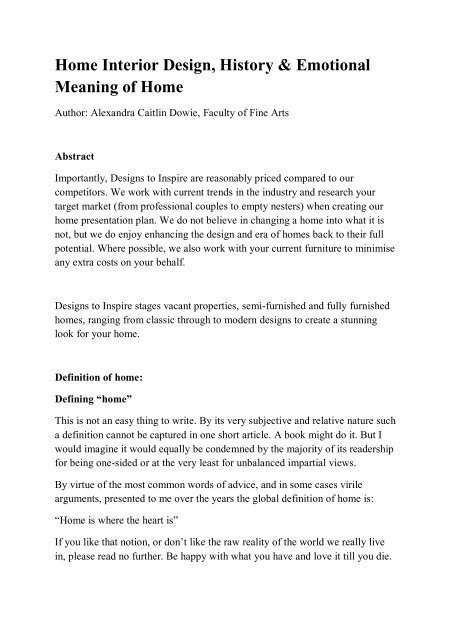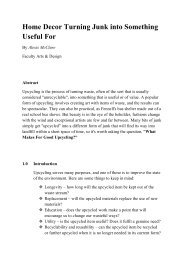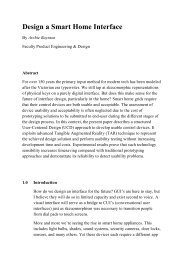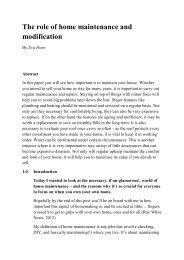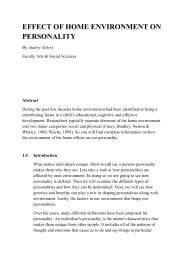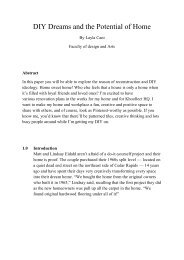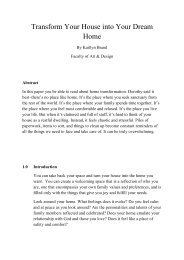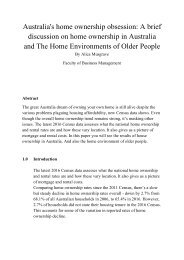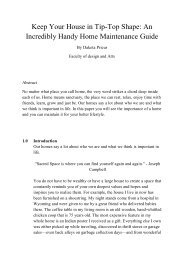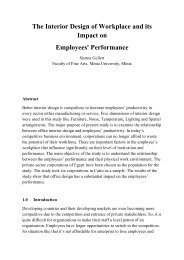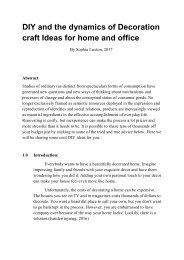Home Interior Design, History & Emotional Meaning of Home
Create successful ePaper yourself
Turn your PDF publications into a flip-book with our unique Google optimized e-Paper software.
<strong>Home</strong> <strong>Interior</strong> <strong>Design</strong>, <strong>History</strong> & <strong>Emotional</strong><br />
<strong>Meaning</strong> <strong>of</strong> <strong>Home</strong><br />
Author: Alexandra Caitlin Dowie, Faculty <strong>of</strong> Fine Arts<br />
Abstract<br />
Importantly, <strong>Design</strong>s to Inspire are reasonably priced compared to our<br />
competitors. We work with current trends in the industry and research your<br />
target market (from pr<strong>of</strong>essional couples to empty nesters) when creating our<br />
home presentation plan. We do not believe in changing a home into what it is<br />
not, but we do enjoy enhancing the design and era <strong>of</strong> homes back to their full<br />
potential. Where possible, we also work with your current furniture to minimise<br />
any extra costs on your behalf.<br />
<strong>Design</strong>s to Inspire stages vacant properties, semi-furnished and fully furnished<br />
homes, ranging from classic through to modern designs to create a stunning<br />
look for your home.<br />
Definition <strong>of</strong> home:<br />
Defining “home”<br />
This is not an easy thing to write. By its very subjective and relative nature such<br />
a definition cannot be captured in one short article. A book might do it. But I<br />
would imagine it would equally be condemned by the majority <strong>of</strong> its readership<br />
for being one-sided or at the very least for unbalanced impartial views.<br />
By virtue <strong>of</strong> the most common words <strong>of</strong> advice, and in some cases virile<br />
arguments, presented to me over the years the global definition <strong>of</strong> home is:<br />
―<strong>Home</strong> is where the heart is‖<br />
If you like that notion, or don’t like the raw reality <strong>of</strong> the world we really live<br />
in, please read no further. Be happy with what you have and love it till you die.
Consider the rest <strong>of</strong> this article a one-sided, uncompromising, opinionated and<br />
inconsequential mish mash <strong>of</strong> a lost man’s words.<br />
If however you are mildly curious to my findings. Then I suggest you pluck<br />
your own thoughts from my words and culminate such findings into your own<br />
definition <strong>of</strong> home. For the reality is, home is where you make<br />
it.(bondcleaninginperth, 2014)<br />
Defining the definition <strong>of</strong> home<br />
Of all the conversations I’ve had regarding my own journey, most come from<br />
two ―classes‖ <strong>of</strong> modern-day society. One class are the people who have jobs or<br />
live in a part <strong>of</strong> a ―moderate/high income society‖.<br />
Figure 1<br />
Mi casa, es su casa … so long as you meet all the requirements and actually<br />
want to live here.<br />
Those that might be reading this on their work computer, on a phone, iPad or<br />
laptop on a daily commute, or at home after a long day looking for a bit <strong>of</strong> <strong>of</strong>f<br />
time escapism. There are also those who are looking for inspiration for reboots<br />
in life or that final push that sets them <strong>of</strong>f a similar track.
The other sector comes from those reading this at home during the day or<br />
middle <strong>of</strong> the night, from a ―lower income part <strong>of</strong> society‖. Generally people<br />
from this side <strong>of</strong> things may not be working full-time jobs and are searching for<br />
visa information, jobs overseas, immigration laws and education overseas.<br />
Either way, in terms <strong>of</strong> the ―home‖ subject matter these are the ―type‖ <strong>of</strong> people<br />
who tend to email me.<br />
There is an interesting pattern to the two ―classes‖ mentioned above. Both come<br />
from all nationalities the world over. From the U.S.A to The Philippines I’ve<br />
had middle to upper income people from both spectrums ask for the answer to<br />
―<strong>Home</strong>‖. Mainly because they’ve had enough <strong>of</strong> living in their current life’s<br />
ways in one shape or another.<br />
I’ve had out <strong>of</strong> work people from the U.K. to Pakistan asking me how to get out<br />
<strong>of</strong> their rut. Where is there a better place to live? And, I’ve had rich people from<br />
France to Honduras ask me where the best place to start over is.<br />
Wealth it would seem does not define home.<br />
Moreover I’ve had all classes from all over the world <strong>of</strong>fer the ―<strong>Home</strong> is where<br />
the heart is‖ solution.<br />
Romanticism is closer than wealth in defining the answer to home.<br />
If there is one global thing we all share, no matter our race, income, religion or<br />
beliefs; it is that we all want a place to call home.<br />
The problem starts when we get it. Because we as humans, in general, always<br />
want more in some form or another.<br />
What do we need to call a place home?<br />
Let’s start at the very basics here. Clean water. You don’t live anywhere for<br />
very long without clean water. Never mind the comforts <strong>of</strong> electricity, living<br />
without water is not possible. Food, shelter, security the list goes on in the basics <strong>of</strong><br />
home dwelling.<br />
The majority <strong>of</strong> the world’s population do not have access to these basic things<br />
we need to call a place a simple home.
Much like the middle paleolithic period some 200,000 years ago our ancestors<br />
were probably faced with similar problems. Droughts, famine, disease, climate<br />
or even war would have meant entire human colonies moving to new regions<br />
just to survive. Though in some cases, quite possibly, someone may have had<br />
the notion that there were better pickings or shelter further along a river or<br />
coast.<br />
So even from our origins we have always sought out the very basic necessities<br />
in setting up a home. Or possibly places that have had more than enough<br />
resources for us to live on and grow with the minimum <strong>of</strong> hardships.<br />
Staying put<br />
That is not to say the entire colony would have left. No, the old, young, sick and<br />
indeed even some smart people would have stayed put. For where there are<br />
fewer people there are more resources to be had. Some people are happy to<br />
make do. Others have no choice. Others more elect to share the burden <strong>of</strong><br />
helping those less fortunate and so they stay behind.<br />
Then, the next generation comes along, and the cycle starts again.<br />
The basics <strong>of</strong> home never change<br />
Today is no different when it comes to the basic needs <strong>of</strong> home. Think<br />
<strong>of</strong> hurricane Katrina in the U.S.A. and the homes that were destroyed. The<br />
people who rebuilt them, and the people who moved on. Think <strong>of</strong> typhoons that<br />
hit The Philippines every year. <strong>Home</strong>s wiped out, and rebuilt every year. And<br />
the people who move away to more stable territories both in-country, and<br />
overseas.<br />
When India was split in two there was a huge migration <strong>of</strong> people who looked<br />
to move to a place they felt would be better to live culturally. Or, more sadly<br />
were forced to leave. In Afghanistan yet more people were forced to migrate to<br />
better places due to invasion and war. While in parts <strong>of</strong> Africa famine and<br />
drought removed the basics <strong>of</strong> home so people frequently move to newer<br />
grounds.<br />
In Europe famine, pestilence and war have seen great sways <strong>of</strong> migrants over<br />
the centuries. Today it’s an economic migratory process as people seek<br />
employment and civil status elsewhere.
Mingle national migratory paths with that <strong>of</strong> individuals who have sought an<br />
equal need to relocate. Death, abuse, finances, greed, mistakes,<br />
love, victimization, prejudice, civil liberties the list goes on for solo migratory<br />
needs for new homes.<br />
However the basic needs that everyone still seeks remain no different than<br />
200,000 years ago. We seek water, shelter, food and a means to gather all in one<br />
place for security and in most cases comfort/prosperity. This is what we call<br />
home, even if we do not truly own it.<br />
Advanced ―home-a-nomics‖ So what happens when we find a place that meets<br />
our basic needs, and even exceeds them? We prosper, procreate and acquire. We<br />
reach levels <strong>of</strong> possession that provide us with further security, comfort and<br />
finally status.<br />
Therein lies one <strong>of</strong> the characteristic traits that define us as human beings today.<br />
The more we have, the more we want. This holds true not just in our<br />
possessions, but also our mentality, and status. Wars have been started for less.<br />
Indeed wars have been declared just on the paranoia <strong>of</strong> losing all that we have<br />
built and acquired around our homes.<br />
The truth is that since the dawn <strong>of</strong> our civilizations we have invaded other<br />
people’s homes not just to acquire, but also to secure and protect our own.<br />
Fragmentation <strong>of</strong> society<br />
Figure 2
If we leave our own society to find a better one we <strong>of</strong>ten become isolated.<br />
Trying to find another society that accepts our values may be asking too much.<br />
Without home there is fragmentation. Our society scatters once it has been<br />
shattered by war, famine or other means <strong>of</strong> homelessness. But, we still take our<br />
own values and definitions <strong>of</strong> culture with us.<br />
Immigration has seen this as cross cultural integration. We heralded this a<br />
further step on our evolutionary paths during the last century. Only the path has<br />
become cracked under the strain <strong>of</strong> unknowing cultural weight. The merging <strong>of</strong><br />
cultures in Europe broke in 2011 as leaders there declared that it simply was not<br />
working the way they envisioned (source.1 boston globe / source.2 bbc). Indeed even<br />
the UNHCR is having similar problems within Nepal with cross<br />
cultural marriages leading to high divorce rates (*source: my republica)<br />
In the Americas a continent is seeing a social pendulum swing hard as the north<br />
struggles under the freedom <strong>of</strong> a weighty bureaucratic system struggling with<br />
economic inequality (source: the economist). While in the south economies distance<br />
themselves even further and gently prosper under the similar traits that their<br />
Eastern ―developing‖ counterparts embellish.<br />
In Asia the cultural path is being paved more with financial might than moral<br />
rights. And the pr<strong>of</strong>its are being reaped proving the latter has indeed less regard<br />
at this point in history (source: the independent).<br />
Social integration lost in the wind<br />
Given the fragmentation <strong>of</strong> a home once it is broken up what hope does one<br />
have when taking your beliefs into a new land? Social integration for me on a longterm<br />
basis was an utter failure. You cannot be someone else other than yourself<br />
no matter where you live. Either for yourself or for someone else.<br />
To me the answer to this is simply that at this moment we as human beings are<br />
not yet evolved, on a global scale, to truly accept everyone into our own worlds<br />
for who they are, let alone give them equal rights.<br />
Without home there is fragmentation<br />
So we move back to knowing that we need a home not just for shelter, but for a<br />
cultural foundation. In today’s world if we do not know our culture we do not<br />
know ourselves. Or we become lost in trying to be someone we are not just to
fit in. So instead we argue and bicker over whose culture is correct on many<br />
levels.<br />
Figure 3<br />
In reality can you ever really fit into a different culture? Moreover, can they<br />
accept you? For the short term yes. For the long term …<br />
Is it my right to live in another culture and tell them that<br />
drinking unfiltered water is bad? Or is it their right to tell me they’ve been<br />
doing it for all their lives and I should adopt their ways? I will argue health and<br />
medical reasons, they will argue the harsh economics and physical presence <strong>of</strong><br />
reality.<br />
My home is fragmented. I will lose the argument even if the evolutionary path<br />
<strong>of</strong> wisdom and experience is on my side. This is human nature. I will hold my<br />
silence and create my own well to survive. And so a divide will occur and I will<br />
always be the outsider. A fragment <strong>of</strong> another society living in a culture that is<br />
on a larger scale most likely also being invaded by a more dominant cultural<br />
force with a different set <strong>of</strong> rules.<br />
Individual extinction is on the cards as a battle for home is fought on all<br />
sides. We have indeed, come full circle.<br />
For me my home for now is right here. The fragments <strong>of</strong> information I’ve<br />
gathered are strung together for all to see. And yes, I am well aware that such a<br />
web <strong>of</strong> personalized twine hangs perilously close to a global razor’s edge.
One small snippet for the those seeking not a home but themselves<br />
How <strong>of</strong>ten do we feel lost within ourselves? Or have met others who claim to<br />
not know themselves anymore. The simple statement <strong>of</strong> not belonging in a place<br />
is a common finding that you might experience when travelling the world or<br />
even before you leave. If not, then you will surely meet such a person sooner<br />
rather than later.<br />
The person going in search <strong>of</strong> themselves<br />
Personally, I already know who I am. As such I am not seeking out who I am,<br />
nor what makes me tick or why I am un/happy. I found this out years ago. But<br />
not everyone is so fortunate nor have they followed a similar path.<br />
In among a midlife crises, a marriage or relationship, even a pr<strong>of</strong>essional<br />
lifestyle one <strong>of</strong>ten sees the frustrations <strong>of</strong> ―finding oneself‖ intermingled with<br />
leaving home and going out to find a better one.<br />
I can tell you the un-romantic truth to this right now: You will inevitably return<br />
to your original home at the end <strong>of</strong> such a journey.<br />
In such cases, you were not looking for a ―home‖ but rather a meaning to your<br />
own ―life’s questions‖. A travel experience will <strong>of</strong>ten provide you with such<br />
answers. Hence you will <strong>of</strong>ten end up back where you started.<br />
There’s a greater chance <strong>of</strong> happiness now as you’ve seen yourself, others and<br />
intermingled experiences for better or worse. If you are still not happy at being<br />
back then perhaps you are seeking such things as less responsibility in the guise<br />
<strong>of</strong> freedom. In which case it’s still not a ―home‖ you are looking for, but rather<br />
answers to who you are.<br />
Find yourself before you try to find home<br />
Is a permanent home abroad so different to what you have now?<br />
Forget one month, six months or even two years. Imagine permanent relocation<br />
to greener pastures. Move past cultural or even social integration. Forget work<br />
visas or even residential visas, least <strong>of</strong> all permanent citizenship that few in<br />
reality will ever acquire in all but a few ―western developed countries‖.<br />
Never-mind owning property in your own name from any country other than the<br />
one you were born in.
Forget about marrying someone from another land and the many years<br />
<strong>of</strong> bureaucratic tape required to let you live in your chosen country together.<br />
Never mind the paragraphs above that they too will now have to endure. And on<br />
that note do remember: One person’s paradise can be another’s hell.<br />
Lastly ignore the fact that if you have a tidy sum <strong>of</strong> money, or political<br />
connections most <strong>of</strong> the above can be eliminated or at worst eased.<br />
Focus instead on the reality <strong>of</strong> living abroad<br />
Surviving the first two years over with, be prepared to look up from your phone<br />
and see the same dull faces on a commute to work. Yes, the surroundings will<br />
be different. But when living a monotonous life <strong>of</strong> survival then most things<br />
look the same no matter the location.<br />
Your dreams <strong>of</strong> home are someone else’s reality<br />
So there you are surrounded by the dull lifeless faces <strong>of</strong> others on your<br />
commute to work. Or alongside you in an <strong>of</strong>fice built for another hammering<br />
out a days work, all with the same intention <strong>of</strong> going home to something better.<br />
Figure 4<br />
What’s paradise to one person is the reason to leave for another. Then again if<br />
we are not happy with ourselves then that paradise can be just as bad as the<br />
place we fought to leave
A television <strong>of</strong>fering escapism. A couple <strong>of</strong> hours <strong>of</strong> cable therapy will numb<br />
the pain. Living a life through others <strong>of</strong>fers a titular hope that helps us pass into<br />
a nights sleep with hopes <strong>of</strong> a better tomorrow.<br />
The notion <strong>of</strong> somewhere better cannot help but pass through our minds. We are<br />
essentially looking for better pastures once again.<br />
While next door there is a person who fought to escape a war, a drought or the<br />
collapse <strong>of</strong> a political system. They marvel at the running water from a tap.<br />
They sit upright in-front <strong>of</strong> a television they just purchased for the first time.<br />
Tomorrow they start a new three month contract for a meaningless job. Yet will<br />
marvel with pride at a weekly pay check that will allow the first visit to a dentist<br />
for their child.<br />
They are living the life you have from their dreams <strong>of</strong> yesterday.<br />
It will continue until the novelty wears <strong>of</strong>f and they too look for a form<br />
<strong>of</strong> escapism on a commute to work and when looking at those similar faces or<br />
moreover; see yours staring back.<br />
A home is not the answer to many people’s definition <strong>of</strong> what it ―should‖ be.<br />
We can have ten homes scattered across the globe and jump between each one<br />
at random intervals and still, eventually, grow lacklustre with a longing for<br />
something more.<br />
In this case, ―home‖ is not what we seek. What we seek is a better life to live in<br />
our homes. By leaving such homes without understanding this we become<br />
fragmented and lost. If that is the case then all the home searching in the world<br />
won’t bring you peace.<br />
The four rules <strong>of</strong> home<br />
Understand the basics <strong>of</strong> survival.<br />
Understand that no four walls nor ro<strong>of</strong> will ever suffice unless you know what<br />
you want in life.<br />
Understand that once you have a family, it’s not just your home, but theirs too.<br />
Live in it together, for each other.
Understand that once you have what you want … you’ll eventually want more.<br />
Be prepared.<br />
The final definition <strong>of</strong> home in 2012. My conclusions in these writings are my<br />
own. Reread the opening paragraphs otherwise it is a fruitless endeavor to<br />
conclude on my thoughts. Throughout these 7 years I know that the thought <strong>of</strong><br />
home evokes many impassioned emotions on many levels from many people. I<br />
wonder why this subject becomes just so impassioned.<br />
There are probably several television series on moving abroad. They are not<br />
built for reality, but for ratings. Escapism is a good rating ploy.<br />
As a matter <strong>of</strong> comfort we generally like, need, and want to define home as:<br />
<strong>Home</strong> is where your heart is most happy. <strong>Home</strong> is a place where you are loved<br />
unconditionally. <strong>Home</strong> is where you feel safe and protected. <strong>Home</strong> is where I<br />
am right now.<br />
The physical reality is this:<br />
―<strong>Home</strong> is located in the place you are best at adapting in‖<br />
It may never be a permanent abode but knowing what you want in life are the<br />
true title deeds <strong>of</strong> home, take such knowledge and make the most <strong>of</strong> it based on<br />
this foundation. (Dave, 2012)<br />
Over time, the Great Australian Dream has meant different things to different<br />
people.<br />
But for the better part <strong>of</strong> a century, any reference to Australian aspirations —<br />
great or otherwise — meant buying a house.<br />
A recent ANU poll found more than three quarters <strong>of</strong> Australians viewed home<br />
ownership as part <strong>of</strong> "the Australian way <strong>of</strong> life".<br />
Yet, for housing experts, this fixation on owning a home <strong>of</strong> your own is<br />
curiously specific at best, and harmful at worst.<br />
"Do you need to own?" urban designer Peter John Cantrill asks, with the<br />
emphasis on "need".<br />
For Mr Cantrill, the operative question is: can you be secure where you live?
Countries such as Germany and Sweden have far lower rates <strong>of</strong> home<br />
ownership, he argues, <strong>of</strong>fset by controlled rents or tenancy insurance.<br />
Now, with many Australians facing mortgage stress or rental stress, the great<br />
Australian dream has become a nightmare. But is this a crisis <strong>of</strong> our own<br />
making?<br />
Figure 5<br />
For some 60,000 years, Australian land was occupied by Indigenous people. Many<br />
were displaced by white settlement.<br />
New South Wales' first Governor, Arthur Phillip, somewhat naively assumed<br />
the British government would own all the land in his newfound colony.<br />
"But what happens very quickly is that people take land without permission,"<br />
Graeme Davison, pr<strong>of</strong>essor <strong>of</strong> urban studies at Monash University, says.<br />
It wasn't all anarchy: freed convicts were granted land in the hope they wouldn't<br />
return to England, and retiring <strong>of</strong>ficers were gifted land, as were free settlers.<br />
And by the time Governor Ralph Darling arrived in 1825, a more orderly<br />
system was implemented.<br />
"From about that point on you begin to get a more systematic freehold land<br />
system," Pr<strong>of</strong>essor Davison says.
"By the 1830s, owning your own piece <strong>of</strong> property was an attainable objective."<br />
One house, one vote<br />
In English cities, land tenure laws and vast church-owned estates precluded<br />
many from ever owning their own plot. This was not the case in Sydney and<br />
Melbourne.<br />
Melbourne in particular experienced quite rapid subdivision in the 1850s which,<br />
combined with the gold rush, lead to the establishment <strong>of</strong> shanty-towns.<br />
"You get quite high rates <strong>of</strong> home ownership in relatively poor parts <strong>of</strong><br />
Melbourne from quite an early age," Pr<strong>of</strong>essor Davison says.<br />
Prior to South Australia's introduction <strong>of</strong> universal manhood suffrage in 1856,<br />
landowning was a way to attain a vote in the political process. It was a line that<br />
continued, even after colonies ceased to apply to property qualifications for<br />
suffrage.<br />
"Right into the end <strong>of</strong> the 19th century, you find people promoting home<br />
ownership saying, 'It will make you a citizen in a fuller sense than if you didn't<br />
own your own house.'"<br />
Figures collected early in Pr<strong>of</strong>essor Davison's career suggest 44 per cent <strong>of</strong><br />
Melburnians owned their own home in 1881, with similar rates in Sydney and<br />
Adelaide.<br />
These are not figures matched anywhere else in the developed world at the time.<br />
"Most other cities don't get anywhere near it," he says.<br />
Grow your own<br />
From the turn <strong>of</strong> the 20th century, Australian houses did something quite<br />
unusual: they fed the families who lived in them.<br />
"The house wasn't just a place to live [in Australia], but it was a place to grow<br />
your food," Mr Cantrill says.<br />
Other countries, he says, would place their farmland outside <strong>of</strong> town centres.<br />
Citizens would walk to the farmsteads, and vice versa.
Figure 6<br />
But that's not what happened in Australia. "We had the agriculture and the<br />
house together, and this established … the so-called quarter-acre block," Mr<br />
Cantrill says.<br />
For Mr Cantrill, the effect his had on Australian cities cannot be overstated.<br />
"This gives shape to cities which are extremely low density and occupy vast<br />
land," he says. These kind <strong>of</strong> cities were also formed by the availability <strong>of</strong><br />
motor vehicles, cheap oil, and an expanding economy.<br />
The dominance <strong>of</strong> the quarter-acre block led to the low density sprawl seen<br />
today: with double garages and media rooms taking the place <strong>of</strong> these early<br />
vegetable plots.<br />
Postwar booms<br />
During the Cold War, Australian governments looked to housing as a means <strong>of</strong><br />
keeping communism at bay. "Citizens committed to mortgages," ran one<br />
wartime advertisement, "tend not to be revolutionaries."
Figure 7<br />
The Menzies government tinkered with the housing mix. "There was quite a<br />
move away from public housing," Lionel Frost, an associate pr<strong>of</strong>essor <strong>of</strong><br />
economics at Monash Business School, says. Menzies' government created<br />
incentives for renters to purchase their houses, if they rented from the Public<br />
Housing Authority. "It was a very much hands-<strong>of</strong>f approach by the<br />
Commonwealth government at the time," Associate Pr<strong>of</strong>essor Frost says. After<br />
World War II, waves <strong>of</strong> migrants came to Australia from England, Ireland and<br />
Europe. Greeks and Italians, in particular were keen to own their own homes.<br />
"They have a very strong preference for having their own home, because it<br />
provided an opportunity not available in Britain or Europe," Associate Pr<strong>of</strong>essor<br />
Frost says.<br />
By the mid 1970s Australian home ownership had reached something <strong>of</strong> a<br />
saturation point: 70 to 75 per cent.
Finance gets involved<br />
The 80s was a time for structural changes around Australian homeowning. The<br />
finance industry was deregulated. Dual income households were the norm,<br />
making mortgages easier to attain. Rising interest rates were followed by<br />
dramatically tumbling interest rates.<br />
"Changes in the availability and the cost <strong>of</strong> finance had really big implications<br />
for the housing market in particular," Nicole Gurran, a pr<strong>of</strong>essor <strong>of</strong> planning at<br />
the University <strong>of</strong> Sydney, says.<br />
Figure 8<br />
Prior to deregulation, the housing system was geared around owner-occupiers,<br />
and property investors loaning from the bank would incur a considerable rate<br />
penalty on their loans.<br />
But the equalising <strong>of</strong> interest rates moved the goal posts <strong>of</strong> home ownership.<br />
<strong>Home</strong>s were increasingly purchased for their exchange value — used as<br />
leverage, as a vehicle for wealth accumulation.<br />
"We certainly have seen an increase in people investing in housing, including<br />
their own housing, with a view to accumulating wealth," Pr<strong>of</strong>essor Gurran says.<br />
"This certainly increased in the 1990s and the 2000s."<br />
By the early 1990s, Pr<strong>of</strong>essor Gurran says, property prices rose faster than<br />
inflation, while interest rates decreased. With the proportion <strong>of</strong> public housing
at a low, a strong private rental market was needed to do "the heavy lifting".<br />
"We start to see things like negative gearing," she notes.<br />
That made investment in the private rental market seem attractive for landlords<br />
— thus expanding the rental market, and their portfolios. (Ros Bluett for Rear<br />
Vision, 2017)<br />
Dorothy was spot-on: There’s no place like it. As we journey through<br />
life―dodging the occasional wicked witch―it’s comforting to know that a cozy<br />
bed, loving arms, and perhaps even a Munchkin or two await, just across the<br />
threshold.<br />
Figure 9<br />
A warm bed that you can’t get out <strong>of</strong> in the morning, a tiny pink toothbrush in<br />
the bathroom, and the sound <strong>of</strong> my husband’s key in the door at the end <strong>of</strong> the<br />
day.<br />
Dena Nilsen<br />
Charlotte, North Carolina<br />
My husband and I moved our family 10 times over a period <strong>of</strong> 22 years. Before<br />
we became nomads, we thought <strong>of</strong> home as where we had grown up. (Iowa for<br />
him, Delaware for me.) Now that we’re adults, home is wherever we gather
with our family and friends. Houses get bought and sold; a home stays with you<br />
always. Anywhere my kids are.<br />
Millie Ayala<br />
Northport, New York<br />
The sensation <strong>of</strong> peace on a cozy, rainy Sunday; the feeling <strong>of</strong> relief when you<br />
pull into the driveway after a long trip; a quiet kiss on the head <strong>of</strong> a baby asleep<br />
in my lap; and the warmth <strong>of</strong> my husband’s arms. <strong>Home</strong> has been many places<br />
for me over the years, but its comforts are defined by simple, blissful moments<br />
like these.<br />
Sarah Bernard<br />
Somersworth, New H<strong>amp</strong>shire (Donna Sullivan Redding, 2015)<br />
The <strong>Emotional</strong> <strong>Meaning</strong> <strong>of</strong> <strong>Home</strong><br />
Our homes are more than financial assets. They have deep emotional meaning.<br />
For those <strong>of</strong> us fortunate enough to have grown up in houses owned by our<br />
parents, they were the backdrop for our childhood memories — the places we<br />
played and argued and hung our artwork and marked the door jam with pencil<br />
lines as we grew taller. For better or worse, the houses <strong>of</strong> our childhoods<br />
represented to many <strong>of</strong> us a good measure <strong>of</strong> the success our parents had<br />
attained, an outward expression <strong>of</strong> how hard work had paid <strong>of</strong>f in comfort and<br />
safety and the respect <strong>of</strong> the community. The lawn got cut. The paint got<br />
freshened up. Maybe a pool got added out back. When things went well, our<br />
houses grew with us.(Jemimah Clegg, 2017)<br />
With the home foreclosure rate in America skyrocketing, our economic<br />
conditions translate into a true public health concern. Losing one’s home can<br />
feel like losing one’s self. Those being foreclosed upon can feel they have let<br />
down their families, that they have been ―exposed‖ as failures in the eyes <strong>of</strong> the<br />
community and that the road back to stability is too full <strong>of</strong> twists and turns to<br />
even begin to think about navigating it.<br />
This perfect storm <strong>of</strong> lowered self-esteem and perceived loss <strong>of</strong> face is indeed<br />
the growing place for divorce, panicdisorder, major depression and stress-related<br />
medical conditions like hypertension. That’s why a national program that would<br />
<strong>of</strong>fer a kind <strong>of</strong> ―outplacement‖ psychological counseling to those who are losing<br />
or who have lost their homes is needed. Our community hospitals, academic
medical centers, family physicians and community mental health centers should<br />
be prepared in a special way for the special burden that home foreclosure<br />
represents.<br />
During my sixteen years practicing psychiatry, I’ve worked with many people<br />
facing financial reversals, including home foreclosure. Some were anxious or<br />
felt hopeless. Some had developed symptoms <strong>of</strong> major depression. Here’s a bit<br />
<strong>of</strong> what I learned and shared that I hope can be <strong>of</strong> help to those who have lost<br />
their homes or are at risk <strong>of</strong> losing them:<br />
Trying to white knuckle your feelings and fears can leave you feeling alone<br />
with them. Voicing them puts them in context — as things happening in your<br />
life, not life itself. Talk more about your feelings and fears, not less.<br />
Every difficult chapter <strong>of</strong> one’s life story <strong>of</strong>fers the chance to rise above it by<br />
showing grit or grace in the face <strong>of</strong> uncertainty. Our loved ones and the<br />
community measure us by assessing our characters, not by calculating our<br />
finances. The way you react in adversity is what defines you, not adversity<br />
itself.<br />
Our financial circumstances are never entirely under our control. The economic<br />
realities <strong>of</strong> the day truly impact what is possible for many <strong>of</strong> us. Millions <strong>of</strong><br />
Americans are losing their homes. If you would not judge them as weak or<br />
unwise, try not to judge yourself.<br />
Seek more information about the economy, not less. You’ve learned the impact<br />
that financial markets can have, in personal terms. Become an even better<br />
student <strong>of</strong> them.<br />
When people look back at their lives, almost all can identify periods <strong>of</strong> great<br />
turmoil, personally or pr<strong>of</strong>essionally or financially. If this is one <strong>of</strong> yours, you<br />
are in pain now, but the overall arc <strong>of</strong> your life story can still be in the direction<br />
<strong>of</strong> success and happiness. Abraham Lincoln, for ex<strong>amp</strong>le, suffered severe<br />
financial reversals and several political losses before his great successes.<br />
No patient has ever described the real assets provided by his or her parents by<br />
the kind <strong>of</strong> house or apartment the family lived in. To a person, the accounting<br />
has always been emotional: Did he or she feel well-loved? Was he or she<br />
listened to? Were his or her dreams encouraged? If you want to put something<br />
that lasts ―in the bank‖ for your kids, tell them that whether you live in a big<br />
house, a little house or an apartment (or even in temporary housing) that you
will always be a family and that you will think about them every day and kiss<br />
them goodnight wherever they go to sleep.<br />
There is great power in shifting from seeing oneself as a victim to seeing<br />
oneself as a survivor. Thinking like a survivor helps you marshal the resources<br />
needed to sure up your family now and your finances over time.<br />
Conditions like major depression and panic disorder and symptoms like<br />
insomnia are among the most treatable in psychiatry. If you are suffering in<br />
these ways, tell your family doctor or a mental health care<br />
provider. Psychotherapyand medication (when indicated) work in over 90 percent<br />
<strong>of</strong> cases.<br />
It’s important to take stock <strong>of</strong> your ―assets.‖ Are you healthy? Are your children<br />
healthy? Are they attending school without serious difficulty? Again, while<br />
home ownership is a wonderful part <strong>of</strong> life, it pales in comparison to other gifts<br />
<strong>of</strong> stability your family may be enjoying right now.<br />
You can train your vision to look past today’s crisis to a better future. Start<br />
planning how you are going to own a home again—today. This can mean<br />
something as simple as opening a new savings account with a tiny deposit. The<br />
concrete intention to begin rebuilding your financial position can help you feel<br />
like you have psychological momentum on your side, or will again soon.<br />
If you know someone who is facing home foreclosure (or whose home has been<br />
foreclosed upon), please print out this blog and share it with him or her. I hope<br />
the words I’ve written will be helpful, but I am certain that your show <strong>of</strong><br />
concern will be. Ultimately, the news is all about people. And, ultimately, it<br />
turns out to be about help and hope and seeing that a better future is always<br />
possible in America. (Keith Ablow, n.d.)<br />
How to keep your home safe and secure<br />
our home should provide all its occupants with a strong feeling <strong>of</strong> comfort and<br />
safety. But how do you achieve a secure home without fortifying it? ADT<br />
Security Services Director Christian Dorau explains that you don’t need to kit<br />
out your home with fierce or fancy security gadgets. By employing a
commonsense approach, following a few standard rules, and getting a basic<br />
security system, you can adequately ward <strong>of</strong>f thieves and guard your property.<br />
Functioning locks<br />
Ensure the windows and doors all have working locks. Dorau suggests that<br />
keeping windows and doors locked, even when you are home, is a positive habit<br />
to keep. He also advises that home occupants remember to secure the shed or<br />
garage with adequate locks. Thieves steal tools, not just television sets, and<br />
could use items in the shed or garage to help break into your property.<br />
Assess weaknesses<br />
Figure 10<br />
―Think like a thief and take a walk around your property to assess it for weak<br />
spots,‖ says Dorau. Ask yourself:<br />
Would a thief think your neighbourhood was an affluent area, worthwhile to<br />
scope out and rob?<br />
Will a thief know you are away on holidays because your bins are not out on bin<br />
day, your mailbox is overflowing, and your car is parked in the same spot for<br />
weeks?<br />
Do you have gifts or expensive items, like an iPad, near a window, enticing a<br />
thief to break in and grab?<br />
Once you know your weak spots, make a plan and find ways to strengthen them.<br />
Lighting
Motion detector lighting located around the exterior <strong>of</strong> your home can deter<br />
thieves and boost your feeling <strong>of</strong> security.<br />
But, Dorau says you don’t have to have a home that looks like a well-lit<br />
fortress, and adds that lighting can be very elegant.<br />
He recommends installing strong floodlights at the back and sides <strong>of</strong> the<br />
building you are securing, and discrete lighting at the front <strong>of</strong> the property.<br />
Landscaping<br />
Ensure the property’s surrounding landscape does not include natural ladders<br />
for thieves to climb on and get into higher parts <strong>of</strong> the house. Keep trees a<br />
distance from the walls <strong>of</strong> your property and trim hedges to ensure no thief can<br />
hide in them.<br />
Garbage<br />
Figure 11<br />
Your garbage is an indicator <strong>of</strong> the items <strong>of</strong> value you have in the house.<br />
―Burglars scoping out a neighbourhood will see that you just made a high-end<br />
electronics purchase if you leave the box your giant television came in near the<br />
bins,‖ he says. Break up the packaging and place it in the recycling bin instead.<br />
Social media<br />
Thieves use Facebook too. Ensure you don’t publicise the contents, location and<br />
availability <strong>of</strong> your property on social media sites. Omit the details <strong>of</strong> your
departure for a holiday from Twitter and avoid posting photos <strong>of</strong> new purchases<br />
online.<br />
Security systems<br />
Install a monitored security system that combines alarms, cameras and motion<br />
sensors to monitor specific zones or the whole property. Alarms can be<br />
activated even when the home is occupied. Once a sensor device picks up<br />
motion, the system can send you an automated text message and video clip, kept<br />
in the cloud, revealing details <strong>of</strong> the motion perceived.<br />
Figure 12<br />
The first aim <strong>of</strong> a home security system, Dorau explains, is to deter thieves from<br />
your home and minimise loss.<br />
―Most importantly, they are about avoiding confrontation with a burglar. These<br />
systems protect the home and its inhabitants by sensing and letting you know<br />
who is in the house and where.‖<br />
―<strong>Home</strong> security and safety is not about being paranoid. It’s about being<br />
responsible. So be proactive: having a feeling <strong>of</strong> security can enhance your<br />
lifestyle.‖ (YASMIN NOONE, 2015)
References:<br />
Dave. (2012). What is the definition <strong>of</strong> home? Retrieved May 15, 2018, from<br />
https://www.thelongestwayhome.com/blog/how-to-live-overseas/what-isthe-definition-<strong>of</strong>-home-2012-edition/<br />
Donna Sullivan Redding. (2015). What Does <strong>Home</strong> Mean to You? - Real<br />
Simple. Retrieved May 15, 2018, from<br />
https://www.realsimple.com/magazine-more/inside-magazine/yourwords/home-meaning<br />
Jemimah Clegg. (2017). 6 home and design blogs you should know. Retrieved<br />
May 25, 2018, from https://www.theweeklyreview.com.au/live/5-homeand-design-blogs-you-should-know/<br />
Keith Ablow, M. D. (n.d.). The <strong>Emotional</strong> <strong>Meaning</strong> <strong>of</strong> <strong>Home</strong> | Psych Central.<br />
Retrieved May 15, 2018, from https://psychcentral.com/lib/the-emotionalmeaning-<strong>of</strong>-home/<br />
bondcleaninginperth. (2014). How to Clean Floating Floors? - Bond Cleaning<br />
Perth. Retrieved May 25, 2018, from<br />
https://www.bondcleaninginperth.com.au/clean-floating-floors/<br />
Ros Bluett for Rear Vision. (2017). A brief history <strong>of</strong> Australia’s obsession with<br />
home ownership. Retrieved from http://www.abc.net.au/news/2017-08-<br />
23/why-australians-are-obsessed-with-owning-property/8830976<br />
YASMIN NOONE. (2015). How to keep your home safe and secure. Retrieved<br />
May 15, 2018, from https://www.domain.com.au/living/how-to-keep-yourhome-safe-and-secure/<br />
Paul Smith. MBA. (n.d.). 4 Ways <strong>Interior</strong> <strong>Design</strong> Can Improve Productivity |<br />
Tangram. Retrieved May 15, 2018, from http://tangraminteriors.com/4-<br />
ways-interior-design-can-improve-productivity/
Pitarma, R. A. &. (2014). <strong>Interior</strong> <strong>Design</strong> and its Impact on <strong>of</strong> Employees’<br />
Productivity in Telecom Sector, Pakistan. Journal <strong>of</strong> Asian Business<br />
Strategy, 42014(6), 74–82. Retrieved from http://aessweb.com/journaldetail.php?id=5006


